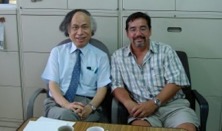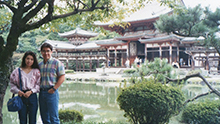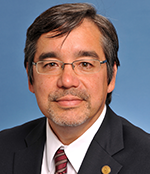Q: Why did you apply for the JSPS Fellowship Program, and what sort of research did you conduct in Japan?

Dr. Palmer and his host researcher, Dr. Shoichiro Fukao, in 1995
Postdocs in general are uncommon in engineering. Usually we’ll go to industry or national labs or to academe almost directly out of PhD. But I wanted to take a break after my PhD studies, so I wanted a postdoc, and very early on, I knew I wanted to do this one. I found out about it through the National Science Foundation. In my research at the time, I was trying to understand turbulence and waves in the atmosphere, and one of the best ways to look at that phenomenon is through the use of radars. Kyoto University had a very advanced radar system; they had the best equipment and some of the most prolific scientists in the world. My PhD advisor had also gone to Kyoto University for about three months and had gotten to know the scientists there, so when I was graduating, he suggested that I go there. Additionally, my mother was Japanese. But I was born here in the United States, and I had never been to Japan before. So, I also had personal reasons I wanted to go.
Q: Who was your host researcher, and how did you find them?
My PhD advisor suggested him to me. It was Shoichiro Fukao, who is world-famous in the area of radar research. He really took me under his wing, not just professionally, but personally; he invited me to his house and I got to know his family. We became lifelong friends. He was a great guy. Just super, super helpful with my career: introducing me to people, giving me opportunities.
Q: What was the result of the research you conducted during your fellowship?
I was able to publish a lot of papers during my time there. The result was a better understanding of turbulence in the atmosphere. Turbulence has a well-known effect on the forecasting of weather; it’s something that has to be incorporated into models which are used for forecasting. Without a good understanding of turbulence, you can’t have accurate forecasts.
Q: How did your host university and JSPS help you adjust to life in Japan?
The housing provided to me by Kyoto University was just fantastic. They have a dormitory for foreigners called the “International House.” And it was very cheap and nice, completely outfitted with dishes and sheets and towels and everything. It was within five minutes’ walking distance to my lab. With the affordable housing provided by the university and the JSPS stipend, I actually had enough money to live very well.

Dr. Palmer and his fiancée visiting the Byōdō-in temple, one of Japan’s National Treasures

Getting married in Osaka

Attending a sumo match in Uji
Q: How do you feel your experience in Japan affected you personally? What were some challenges and highlights of your time there?
I remember being very excited during my first month in Japan, and then after that, I started to get lonely for home. And back then, of course, there wasn’t Skype, so the telephone calls were very expensive. But then I started to meet people, outside of work. And all of the sudden, it became very fun. You just become part of the community; that’s when it becomes very satisfying. Kyoto is just a fabulous city to study in, because there are so many things to see. Personally, just getting to see some of my heritage and seeing things that I had heard about when I was growing up from my mom, but had never seen – that just really had a huge impact on me. Some of my students are pretty worldly and they’ve traveled already. But I had not been in that situation. In Japan, I realized how big the world was. And I met my wife there, too.
Q: How do you feel your JSPS fellowship impacted your career?
At that time, Kyoto University was inviting a lot of foreign scholars to conduct research, so I met some of the most famous people in the world that work in my area during my time there. In general, the visitors to the lab were extremely important. There were at least two eminent foreign scholars in my lab that would rotate out about every three months. In fact, I ended up writing a book together with Wayne Hocking, Jürgen Röttger, Toru Sato, and Phillip Chilson, and I met several of those researchers in Japan. Also, another person I met in Japan was a researcher from Clemson University in South Carolina, Miguel Larson. While we were both at Kyoto University, he asked me to join him at Clemson when my fellowship was over, and that was my first tenure-track faculty position. I was there for two years, and I continued working with Japanese researchers during that time. While I was at Clemson, I came back to Japan at least twice, and even after that, when I was hired at the University of Nebraska, I continued to return to conduct research. In fact, for about a decade, I participated in a funding program from JSPS where I was paid to return to Japan for a few months at a time. I’d bring the data I collected in Japan back to my students and colleagues. Even today, at Oklahoma University, we work with many Japanese partners. We have a huge research relationship with Weathernews, Inc. [a Japanese weather forecasting company that has a facility on the Oklahoma University campus], and also with other Japanese companies such as Toshiba. My time in Japan gave me credibility with Japanese scholars, and that helped form these relationships.
Q: What would you like to say to possible future JSPS fellowship applicants?
I always tell my students…it sounds kind of vague, but it will definitely change your life. I can’t even imagine what my life would have been if I didn’t go to Japan. But I bet it would have been a lot less successful and much more boring. |














